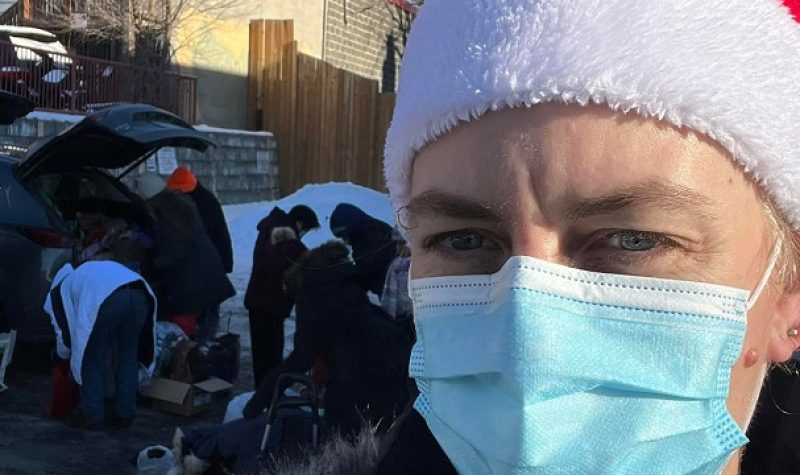There are several shelters in Ottawa that offer outreach to almost 1,500 homeless individuals and families in the city, but many people remain without shelter or food.
Shawna Thibodeau says her job is to reach the people who fall through the cracks. She is an outreach worker with a simple mission-statement: “If you’re hungry, I’ll feed you.”
Thibodeau has been working with outreach centres in the city for over a decade. She founded Shawna’s Outreach in 2019, at the beginning of the pandemic, when she began to see the effects of COVID-19 on Ottawa’s homeless and at-risk populations.
“Basically, my goal and my mission, my everything, is to get food to hungry people, or supplies that are needed to people who need them without anyone spending money,” says Thibodeau. “My theory is we all have something that we can give, and even the people who think they have nothing, many of us have time.”
As a single mother who has experienced housing insecurity herself, Thibodeau says she doesn’t have any money to give, but she has a wealth of time on her hands, which she happily lends to others.
She runs the outreach through her home, where she stores all the donations she collects, before delivering them to clients by car.
Thibodeau, originally from Nova Scotia, moved to Ottawa in 2008. She began volunteering at outreach centres in exchange for food and other necessities.
“When I moved here, and I needed help, and I knew what it was like to go without and be refused help and not have access to things my child and I needed, I reached out to organizations, and it was kind of like, ‘I'll help you, but I'm also going to get something for myself,’” says Thibodeau.
Now, Thibodeau collects, packages and delivers donations of food, clothing, toiletries and other necessities to about a dozen individuals and families across the city every week. She thinks of herself as the “middle-man” between donors, who may not know where to bring their donations, and Ottawa’s homeless communities.
Like many local food banks and charities, she runs a food-hamper program around the holidays. However, she says she tries to instill in people the idea that there is always a need for food, not just during the “giving season.”
Thibodeau says that a common misconception about emergency shelters is that they provide food for the people using them. She says, in reality, most shelters are spread so thin that they are only able to provide the bare minimum.
“Some provide nothing but that room at night,” says Thibodeau. “You have to be checked in, like at a certain time or you lose your spot. I talk to people often at shelters and they tell me what it's like inside. And I praise shelter workers. It's not their fault, they're just doing the best they can with what they have.”
Much of Thibodeau’s work revolves around providing overlooked services to Ottawa’s homeless communities.
Thibodeau recalls when restrictions first closed the doors of restaurants and public washrooms, she spent much of her time helping people use the streets to relieve themselves.
“When we first locked down, our homeless and at-risk-of-being-homeless population were hit the hardest,” says Thibodeau. “These people lost everything after already having nothing. The people who live outside lost their bathroom when the restaurants closed… So in the very beginning, I was bringing wipes and toilet paper and helping people use the bathroom on the sidewalk. Because it's all they have.”
Thibodeau is Métis, Mik’maq, and French-Acadian. She says she’s constantly saddened by the disproportionate number of Indigenous people she sees living on the streets.
Although Indigenous people account for only 2.5 per cent of Ottawa’s overall population, they make up 24 per cent of the homeless population, according to The Homeless Hub.
Thibodeau says she is honoured to be able to bring sage, a medicine which is considered sacred to many Indigenous peoples, to homeless individuals who identify as Indigenous.
“Every time I've offered sage, it has been a magical moment,” says Thibodeau. “Because this is not something they can get easily, as much as they should. Not all of them are connected to Indigenous-related shelters or drop-ins, or things like that.”
In addition to her outreach work, Thibodeau speaks to youth of all ages at schools around the city.
Thibodeau says she tries to teach people that everyone has something to share, regardless of their means.
“I tell people, students mostly, they're like, ‘What can we do?’” says Thibodeau. “Smile and eye contact. When you walk past somebody sitting on the sidewalk, they don't need us looking the other way rolling our eyes. Smile, eye contact. It's a fraction of… your time. And it's going to make them feel a heck of a lot better.”
Thibodeau added that even a spare pair of socks, or a $3 gift-card to Tim Hortons can be a life-saving donation for someone who is cold or hungry.
For more information about Shawna’s Outreach, visit the Facebook page.


